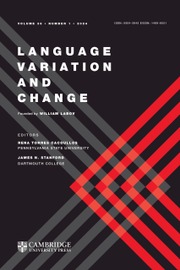Crossref Citations
This article has been cited by the following publications. This list is generated based on data provided by
Crossref.
Moore, Emma
2004.
Sociolinguistic Style: A Multidimensional Resource for Shared Identity Creation.
Canadian Journal of Linguistics/Revue canadienne de linguistique,
Vol. 49,
Issue. 3-4,
p.
375.
Cornips, L.
2006.
Encyclopedia of Language & Linguistics.
p.
330.
2008.
Book reviews.
Folia Linguistica,
Vol. 42,
Issue. 3-4,
Smith, Jennifer
Durham, Mercedes
and
Fortune, Liane
2009.
Universal and dialect-specific pathways of acquisition: Caregivers, children, and t/d deletion.
Language Variation and Change,
Vol. 21,
Issue. 1,
p.
69.
WHITE-SUSTAITA, JESSICA
2010.
Reconsidering the syntax of non-canonical negative inversion.
English Language and Linguistics,
Vol. 14,
Issue. 3,
p.
429.
Nevalainen, Terttu
Raumolin-Brunberg, Helena
and
Mannila, Heikki
2011.
The diffusion of language change in real time: Progressive and conservative individuals and the time depth of change.
Language Variation and Change,
Vol. 23,
Issue. 1,
p.
1.
Stell, Gerald
2012.
Comparability of the Black-White Divide in the American Speech Community and the Coloured-White Divide in the Afrikaans Speech Community.
American Speech,
Vol. 87,
Issue. 3,
p.
294.
Brezina, Vaclav
and
Meyerhoff, Miriam
2014.
Significant or random?.
International Journal of Corpus Linguistics,
Vol. 19,
Issue. 1,
p.
1.
Romero, Sergio
2015.
The emergence of negative concord in Santa María Chiquimula K'ichee’ (Mayan): A variationist perspective.
Language Variation and Change,
Vol. 27,
Issue. 2,
p.
187.
Kingstone, Sydney
2015.
“Scottish”, “English” or “foreign”.
English World-Wide. A Journal of Varieties of English,
Vol. 36,
Issue. 3,
p.
315.
Lien, Chinfa
2016.
閩南語「免」bian2的用法初探.
Bulletin of Chinese Linguistics,
Vol. 9,
Issue. 1,
p.
58.
Childs, Claire
2017.
Integrating syntactic theory and variationist analysis: The structure of negative indefinites in regional dialects of British English.
Glossa: a journal of general linguistics,
Vol. 2,
Issue. 1,
Palacios, Ignacio M.
2017.
Negative concord in the language of British adults and teenagers.
English World-Wide. A Journal of Varieties of English,
Vol. 38,
Issue. 2,
p.
153.
SMITH, JENNIFER
and
HOLMES-ELLIOTT, SOPHIE
2018.
The unstoppable glottal: tracking rapid change in an iconic British variable.
English Language and Linguistics,
Vol. 22,
Issue. 3,
p.
323.
Cao, Luwen
and
Bao, Zhiming
2018.
Negation and Negative Concord.
Vol. 55,
Issue. ,
p.
153.
Holmes-Elliott, Sophie
and
Smith, Jennifer
2018.
Dressing down up north: DRESS-lowering and /l/ allophony in a Scottish dialect.
Language Variation and Change,
Vol. 30,
Issue. 1,
p.
23.
Blanchette, Frances
and
Nadeu, Marianna
2018.
Prosody and the meanings of English negative indefinites.
Journal of Pragmatics,
Vol. 129,
Issue. ,
p.
123.
Burnett, Heather
Koopman, Hilda
and
Tagliamonte, Sali A.
2018.
Structural explanations in syntactic variation: The evolution of English negative and polarity indefinites.
Language Variation and Change,
Vol. 30,
Issue. 1,
p.
83.
BLANCHETTE, FRANCES
and
LUKYANENKO, CYNTHIA
2019.
Unacceptable grammars? an eye-tracking study of English negative concord.
Language and Cognition,
Vol. 11,
Issue. 1,
p.
1.
Blanchette, Frances
and
Collins, Chris
2019.
On the Subject of Negative Auxiliary Inversion.
Canadian Journal of Linguistics/Revue canadienne de linguistique,
Vol. 64,
Issue. 1,
p.
32.


